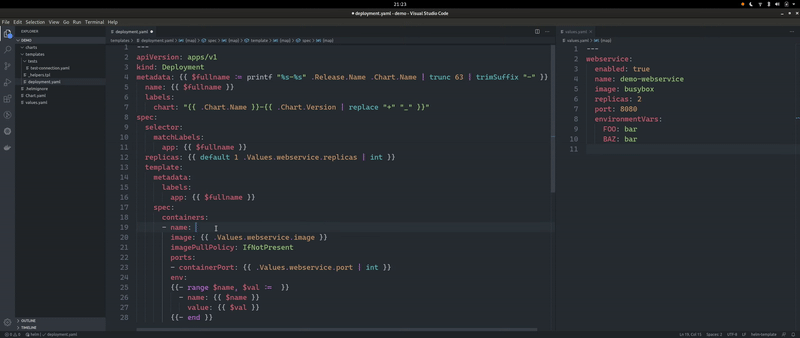Helm-Intellisense
 Helm-Intellisense copied to clipboard
Helm-Intellisense copied to clipboard
Extension for Visual Studio Code - Intellisense in helm-templates from the values.yaml
trafficstars
Helm-Intellisense



Extension to help writing Helm-Templates by providing intellisense

Features
- The
values.yamlfile of the chart will be read and evaluated automatically to provide intellisense. - Autocomplete will also work for all
Named Templatesdefined in the any.tplfile. - Autocomplete for defined helm variables.
- Compatible with Windows and Linux/Unix.
- Support for custom named value files is provided (see settings section below).
- Lint command to validate correct values templating and usage of NamedTemplates.
- Support and autocomplete for
yamlanchors and labels - The extension is compatible with the
Kubernetesextension. - Working with language type
yamlandhelm-template.
Commands
Helm-Intellisense: Lint: This command parses the currently active document and validates that all paths(like.Values.foo.bar) point to valid values.Helm-Intellisense: Lint Chart: Equivalent toLintcommand but for all files in the chart of the file that is currently active.
Settings
| Setting | Description |
|---|---|
helm-intellisense.customValueFileNames |
Defines list of possible files containing values (default: values.yaml) |
helm-intellisense.lintFileOnSave |
If set to true the Helm-Intellisense: Lint command will be executed on save (default: true) |
helm-intellisense.excludeFromLinting |
Define a list of filenames which should be excluded from linting. Wildcards are also possible (Example: *.gotmpl) |
Multiple value files (overriding)
When mulitple value files are defined they are parsed from the bottom up:
"helm-intellisense.customValueFileNames": [
"prod-values.yaml",
"dev-values.yaml",
"values.yaml"
]
In this case values will be overwritten/merged by dev and dev by prod. This also means that the linter will only throw an error if a certain key is not found in any of the specified files.
